Grassley Pushing SAF Tax Incentive and Biodiesel Tax Incentive Extension in Year-End Package

IMF slashes global GDP forecast as economic outlook grows 'gloomy and more uncertain’
|
In Today’s Digital Newspaper |
Volodymyr Zelenskyy, Ukraine’s president, accused Russia of “gas blackmail” after Gazprom announced it would further cut gas flows through the Nord Stream 1 pipeline to Europe. Daily deliveries will drop to 20% of capacity, from the current 40%. Meanwhile, European countries reached a watered-down agreement to curb their consumption of natural gas over the next eight months in an effort to shield their economies from a possible cutoff of Russian supplies.
Ukrainian forces are preparing for a high-stakes counteroffensive to retake Kherson, a crucial Russian stronghold in southern Ukraine. Moscow uses the vital port city as a base to launch attacks across a large part of Ukrainian territory. The Ukraine attack would be one of the most ambitious and significant military actions of the war. The New York Times reports that Ukraine is destroying Russian ammunition depots, hitting command posts and targeting supply lines. And Ukrainian troops have liberated 44 towns and villages along the border areas, about 15% of the territory, according to local officials. Bottom line: The counteroffensive could change the balance of power in the south. The region is critical to Ukraine’s plan to resume grain exports across the Black Sea despite a recent Russian missile attack on the port of Odesa (see Russia/Ukraine section for an update on the possible resumption of Ukrainian grain exports).
Russia will withdraw from the International Space Station project “after 2024” after fulfilling its obligations, according to the Kremlin readout of a meeting between the newly appointed head of Roscosmos, Yuri Borisov, and Russia’s President Vladimir Putin.
U.S. officials fear that China could move against Taiwan over the next year and a half — perhaps by trying to cut off access to the Taiwan Strait, through which U.S. naval ships regularly pass. The internal worries have sharpened in recent days, as the administration works to dissuade House Speaker Nancy Pelosi (D-Calif.) from going through with a proposed visit to Taiwan next month. Chinese officials have denounced Pelosi’s plans and threatened retaliation.
China tried to build a network of informants inside the Federal Reserve system and even detained a Fed economist, a report by Senate Republicans found.
IMF slashes global GDP forecast as economic outlook grows 'gloomy and more uncertain.’ Details below.
Walmart pared down its profit forecast for this year, predicting its annual profits will decline by 11-13%, as food and fuel prices force consumers to reduce discretionary spending. In mid-May, management said that operating income would be flat year over year. Bottom line: Walmart has been needing to discount its products more and more to clear inventory. That's bad for profit margins. Walmart is scheduled to report its fiscal second quarter results — covering the May-June-July period — on Aug. 16.
If you think an incentive for Sustainable Aviation Fuel (SAF) was dead because of Dems inability to include it in a coming reconciliation package, think again. The push is on for that incentive, plus an extension to the expiring biodiesel tax incentive, in a likely year-end tax package.
The Energy Department said it would loan to a General Motors joint venture $2.5 billion to fund the construction of three battery-cell factories.
A gallon of regular unleaded gas dropped to $4.36 on average as of Monday, about 17 cents less than last week and a 66-cent plummet from the peak on June 14. If the current trajectory keeps up, Americans will see the average price fall below $4 per gallon in two weeks.
The National Football League threw its hat into the streaming wars ring by unveiling new subscription service NFL+. The service, the first of its kind among major American sports leagues, aims to preserve relationships with traditional media outlets by only offering mobile streaming.
Election Day 2022 is 105 days away. Election Day 2024 is 833 days away.
|
MARKET FOCUS |
Equities today: Global stock markets were mixed. In Asia, Japan -0.24%. Hong Kong +1.67%. China +0.83%. India -0.84%. In Europe, at midday, London +0.57%. Paris -0.1%. Frankfurt -0.3%. The U.S. Dow is currently trading around 130 points lower. In the U.S., this is the busiest week of the Q2 earnings reporting cycle. McDonald's and Coke reported earnings this morning, giving investors of taste of how people are contending with high inflation. Coca-Cola topped analysts’ estimates on its top and bottom lines, as it raised prices to offset higher costs on things such as freight, aluminum and corn syrup. McDonald’s, meanwhile, said same-store sales increased 3.7% in the U.S., beating StreetAccount estimates of 2.8%. The rise was largely due to some price hikes and the popularity of its value offerings, McDonald’s said. Also reporting today are Facebook (Meta), Google (Alphabet) and Microsoft.
General Motors today posted earnings that fell short of Wall Street’s expectations. The Detroit automaker said parts shortages prevented it from shipping nearly 100,000 vehicles during the most recent quarter. The company, however, maintained its profit outlook for the year. GM is also getting ready for a potential recession, according to CEO Mary Barra. “We have also modeled many downturn scenarios and we are prepared to take deliberate action when and if necessary,” she said in a release. Ford is slated to report results after the bell Wednesday.
U.S. equities yesterday: The Dow gained 90.75 points, 0.28%, at 31,990.04. The Nasdaq lost 51.45 points, 0.43%, at 11,782.62. The S&P 500 rose 5.21 points, 0.13%, at 3,966.84.
Agriculture markets yesterday:
- Corn: December corn firmed 19 1/2 cents to $5.83 3/4.
- Soy complex: November soybeans fell 30 1/4 cents to $13.46. September meal rose $15.90 to $415.20. September soyoil fell 51 points to 58.32 cents.
- Wheat: September SRW rose 11 cents to $7.70. September HRW rose 19 1/2 cents to $8.39 3/4. December spring wheat rose 14 cents to $8.98.
- Cotton: December cotton rose 17 points to 91.06 cents per pound, around the middle of the day’s range.
- Cattle: August live cattle rose 37.5 cents at $137.75, the contract’s highest closing price since April 26. August feeders fell $2.25 to $179.30.
- Hogs: August lean hogs fell $1.475 to $117.225, while October futures declined $2.20 to $94.125.
Ag markets today: Corn and soybean futures gapped higher overnight after USDA’s crop condition ratings dropped more than expected. Wheat futures followed to the upside. As of 7:30 a.m. ET, corn futures were trading 13 to 14 cents higher, soybeans were 20 to 22 cents higher and wheat futures were 13 to 15 cents higher. Front-month crude oil futures were around $1.65 higher and the U.S. dollar index was more than 600 points higher this morning.
Technical viewpoints from Jim Wyckoff:
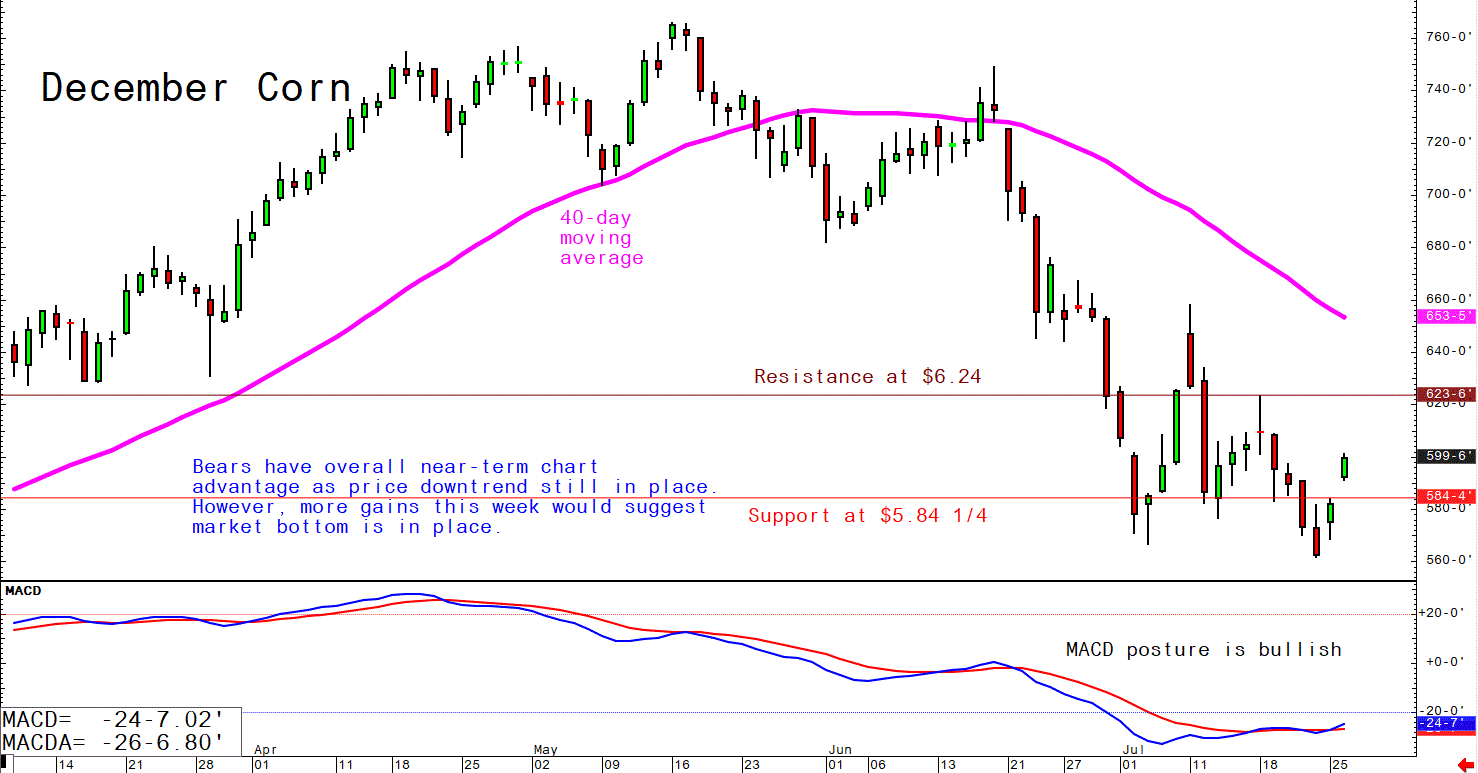
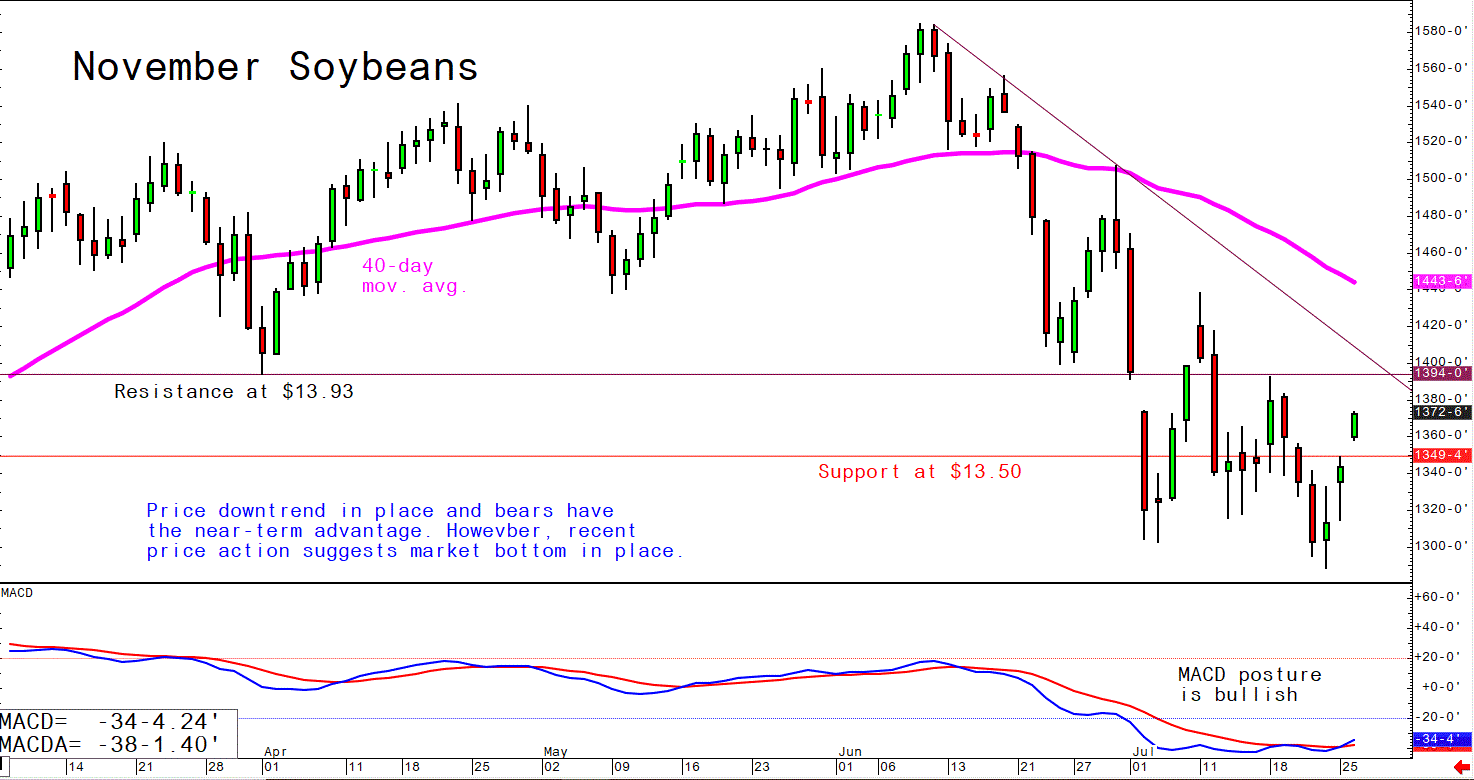
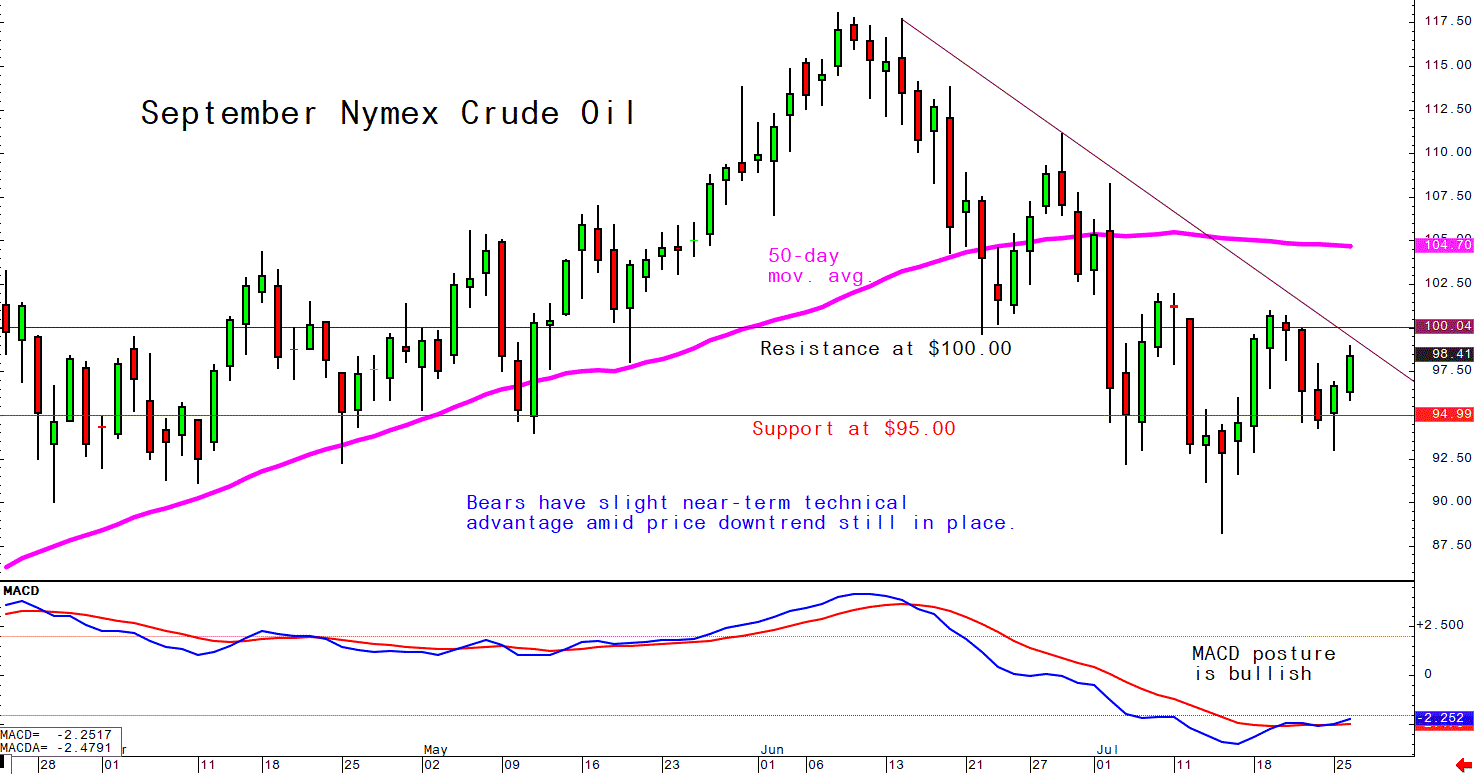
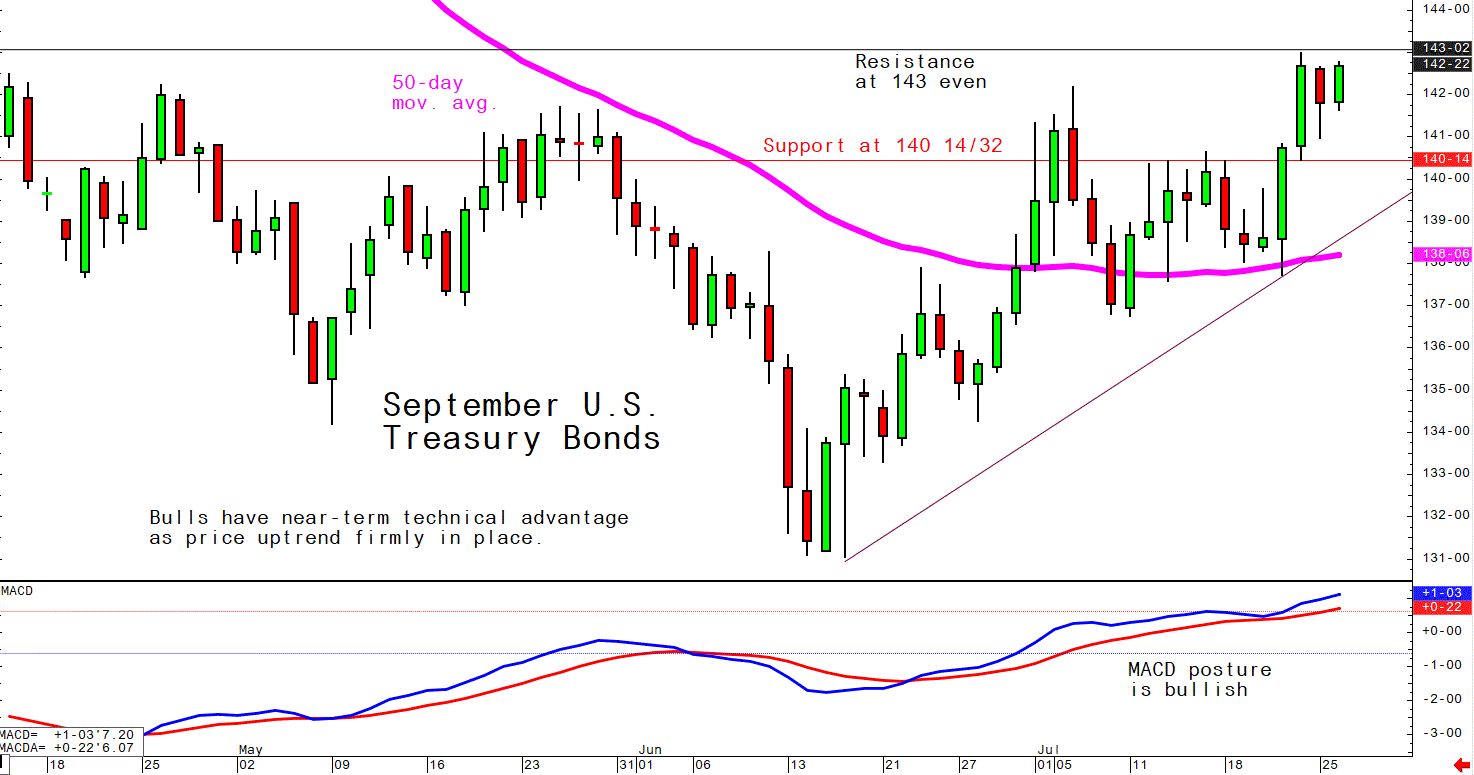
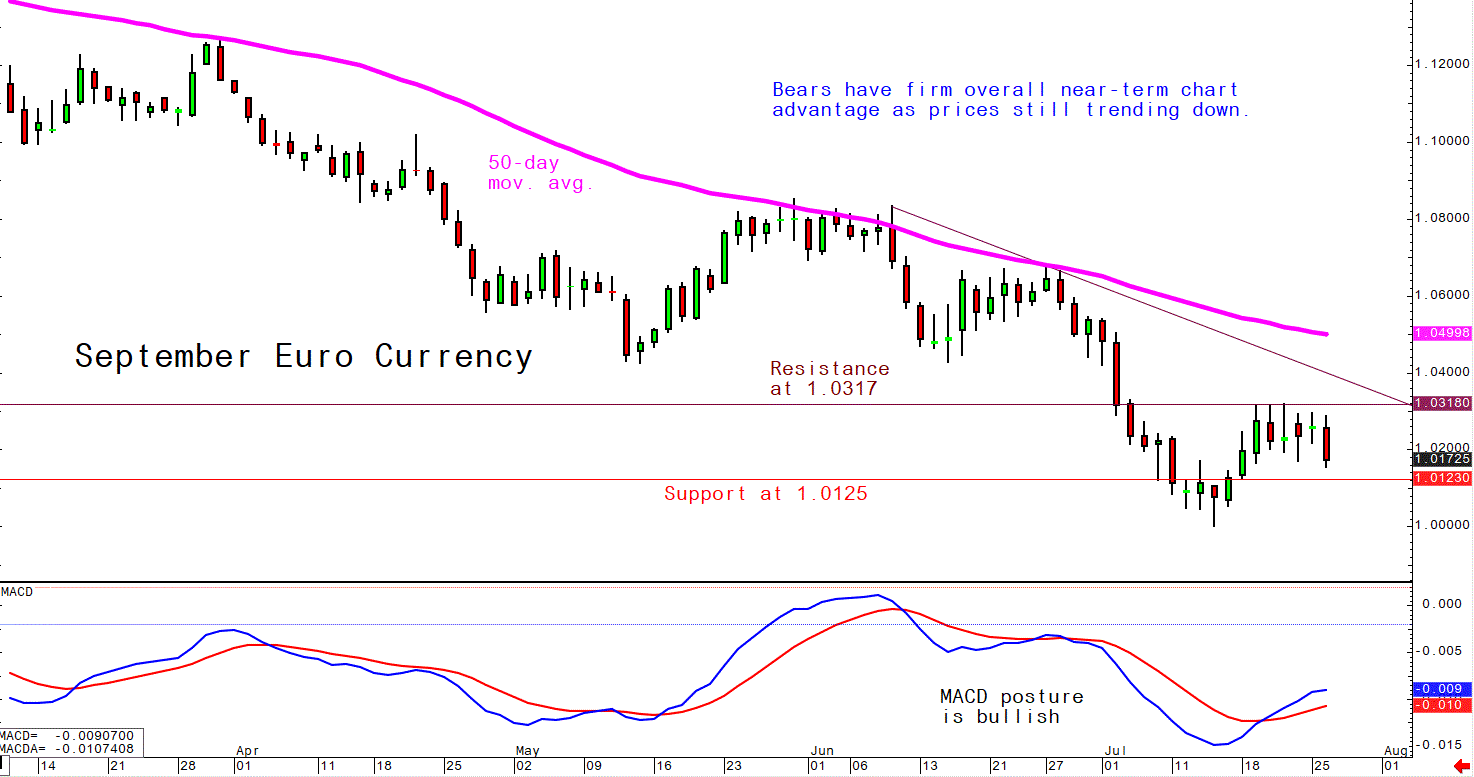
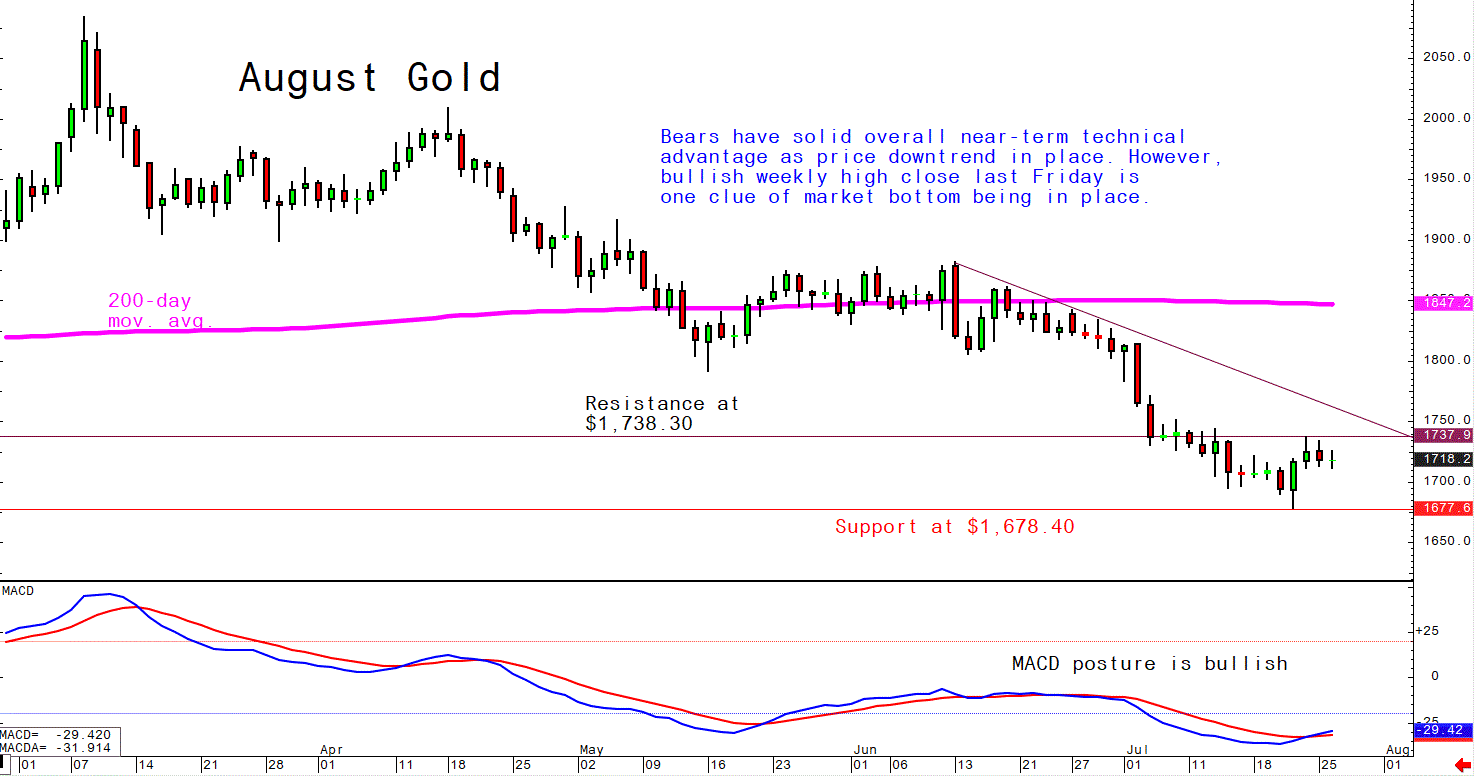
On tap today:
• International Monetary Fund releases forecasts for global growth in its updated World Economic Outlook. (9 a.m. ET) See related item below for the forecasts.
• S&P CoreLogic Case-Shiller's 20-city home price index for May is expected to rise 20.8% from one year earlier. (9 a.m. ET)
• U.S. new-home sales are expected to fall to an annual pace of 660,000 in June from 696,000 one month earlier. (10 a.m. ET)
• Conference Board's consumer confidence index is expected to fall to 97 in June from 98.7 one month earlier. (10 a.m. ET)
• Richmond Fed's manufacturing survey is expected to rise to minus 10 in July from minus 19 one month earlier. (10 a.m. ET)
• President Biden will meet virtually with the head of South Korea’s SK Group, which today is announcing a major $22 billion investment in American manufacturing.
Walmart warns of lower profit due to food, gas inflation. Walmart on Monday lowered its profit outlook for the second quarter and the full year, citing surging inflation on basics like food that is forcing shoppers to cut back on discretionary items, particularly clothing, that carry higher profit margins. “The increasing levels of food and fuel inflation are affecting how customers spend,” said Walmart CEO Doug McMillon in a statement. That behavior is forcing the nation’s largest retailer, based in Bentonville, Ark., to step up discounts on general merchandise items like home furnishings and electronics to move inventory. Walmart’s shares fell nearly 9% in after-hours trading Monday.
The IMF now expects the world economy to grow 3.2% in 2022 before slowing to a 2.9% GDP rate in 2023 — marking a downgrade of 0.4 and 0.7 percentage points, respectively, from April. The Washington-based institute said the revised outlook indicated that the downside risks outlined in its earlier report were now materializing. Those include soaring global inflation, China’s slowdown and the war in Ukraine. The IMF last published its World Economic Outlook in April. Back then it revised down its forecast for world GDP growth in 2022 by nearly a full percentage point, to a so-so rate of 3.6%.
The anticipated slowdown would mark the first quarterly contraction in global real GDP since 2020. A “plausible” but less likely alternative scenario could see global growth fall to around 2.6% in 2022 and 2.0% in 2023, the IMF said, putting global growth in the bottom 10% of outcomes since 1970.
Worsening growth prospects in the U.S., China and India drove the IMF’s downward revisions. The U.S.’s GDP outlook was lowered 1.4 percentage points to 2.3%, driven be weaker-than-expected growth in the first half of 2022, reduced household purchasing power and tightening monetary policy. China’s economy was seen growing 1.1 percentage points short of previous estimates, following extended Covid lockdowns and a deepening real estate crisis. The world’s second-largest economy is now expected to grow 3.3% in 2022 — its lowest clip in four decades, barring the initial fallout from the Covid-19 crisis in 2020.
FOMC meeting begins today with announcement and presser on Wednesday. After the Federal Reserve lifts its benchmark interest rate on Wednesday, attention will turn to what Chairman Jerome Powell says about a rate increase at the central bank’s meeting in September. The Fed is likely to raise its federal-funds rate by 0.75 percentage point, to a range between 2.25% and 2.5%, at this week’s meeting. While further rate rises are likely this year, the Wall Street Journal, citing analysts, says Powell might be less specific about his expectation for their sizes. Such reticence would give officials more flexibility in planning their next few moves.
Young trucker program applications begin. Motor carriers will be able to apply for a program starting today that would allow people as young as 18 to drive trucks on the interstate, Transportation Department officials said in a webinar Monday about its new Safe Driver Apprenticeship Pilot Program. The Federal Motor Carrier Safety Administration, which posted an information collection request on the program in January (link), estimates it will take 30 days to review carrier applications. The program was created by the infrastructure law.
Only in America… Most people in the world are confident they can lead a "comfortable life” with $10 million, according to a recent study. Americans have a different take. In the U.S., the majority of people polled say they’d need at least $100 million to live an ideal life, starkly contrasting with Russians and Indians, who indicate they could make do on $1 million or less. Link to Forbes article.
Market perspectives:
• Outside markets: The U.S. dollar index is higher. The yield on the 10-year U.S. Treasury note is weaker, around 2.75%, with a weaker tone in global government bond yields. Gold is lower and silver higher ahead of US economic data, with gold around $1,715 per troy ounce and silver around $18,35 per troy ounce. Crude is heading higher before U.S. market action, with U.S. crude around $98.50 per barrel and Brent around $102 per barrel.
• The main European natural gas benchmark surged almost 11% today, and is up close to 15% in two trading days. The U.S. price of natural gas jumped more than 5% today, stretching its two-day rally to 10%. European and U.S. oil prices both rose roughly 2%.
• U.S. natural gas supply and demand balance shifts amid outage at Freeport LNG. Link for details.
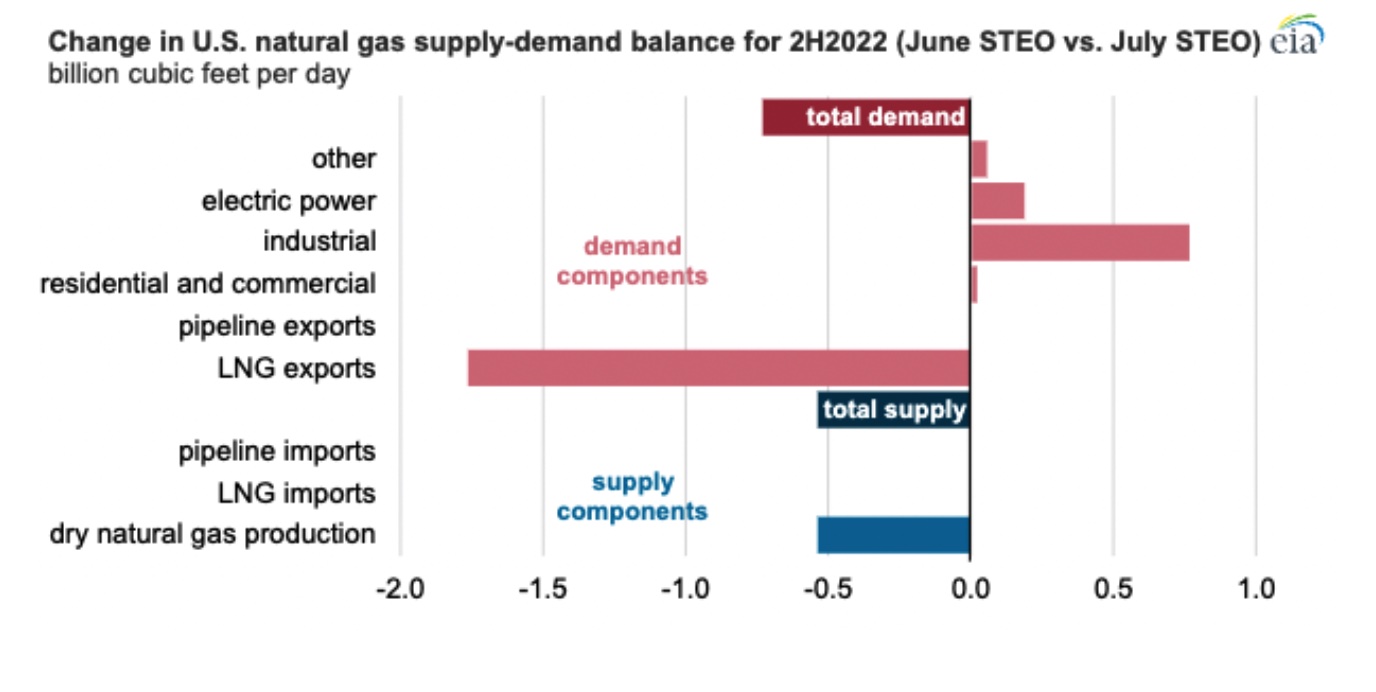
• Port of Oakland reopens after trucker protest, but backlog issues remain. Independent truckers halted their protests that blocked gates at the Port of Oakland, allowing containers to again move at the port. The truckers had protested a new California “gig economy” law (AB5). The process of clearing the backlog of containers created by the protests has started, but the Wall Street Journal said some observers believe it will take potentially weeks for operations to return to normal. Oakland’s next task will be soothing importers and exporters whose goods were tied up during the blockade, raising new concerns for shippers already wary of potential turmoil during port labor negotiations. Port officials said in a message to the protesting truckers last week that ongoing disruptions could “drive customers away.”
• Grain trader and analyst Richard Crow on grain trade: “Europe is reportedly buying Brazil corn, and barge freight in the U.S. has increased, which may signal some business here. Brazil's corn basis has increased in value over the last few days. On a delivered value, U.S. corn is the cheapest except for China and Asia markets. That said, Europe will buy non-GMO corn, and countries like Iran will buy Brazil's corn. China has been rumored to have bought some U.S. new crops yesterday."
• NWS weather: Dangerous heat to bake the Pacific Northwest and portions of the South Central U.S. through mid-week... ...A stormy and wet pattern to drench the Middle Mississippi Valley to the central Appalachians; Moderate Risk for Excessive Rainfall in West Virginia and eastern Kentucky on Wednesday... ...Monsoonal moisture to cause daily rounds of excessive rainfall and flash flooding across portions of the Southwest and Southern Rockies.

Items in Pro Farmer's First Thing Today include:
• Strong price gains overnight
• Consultant cuts U.S. corn, soybean yield forecasts
• Heat takes bite out of corn, soybean and spring wheat CCI ratings
• Big increase in Kazakhstan wheat production
• Beef prices firm, but movement limited
• Cash hog fundamentals continue to strengthen.
|
RUSSIA/UKRAINE |
— Summary: Ukraine is planning a major counteroffensive to retake the key city of Kherson, “one of the most ambitious and significant military actions of the war” and a potential victory that they hope could change its course, the New York Times reports (link). Western officials are split over whether it’s the right move right now, and what Kyiv’s chances of success are.
- As we alerted earlier, Russian gas giant Gazprom will cut shipments via the Nord Stream 1 pipeline — the main link to the EU — to about 20% capacity tomorrow, raising worries that Moscow will use supplies to undermine Europe’s support for Ukraine as winter approaches. The pipeline had restarted on Thursday after shutting down for 10 days for retooling, and European officials accused Moscow of weaponizing energy in retaliation for wartime sanctions. Gazprom claims it needs to lower capacity so it can fix a turbine in the 760-mile undersea pipeline. Germany said there's no technical reason for a reduction in flows. Natural gas futures in Europe spiked 10% when the news broke Monday. Ever since Russia invaded Ukraine in February—and then got slapped with Western sanctions — it has pulled back gas shipments to the EU and cited technical issues as justification.
Of note: The U.S. has become the world’s largest exporter of LNG as increased demand from Europe amid the war in Ukraine drove an increase in exports to an average of 11.2 billion cubic feet per day, a rise of 12% compared to the second half of 2021. Roughly 71% of LNG exports were shipped to the European Union and Great Britain during the first five months of the year, according to the Energy Information Administration. Shipments to Europe have even surpassed what president Joe Biden had promised.
- Russian oil exports have fallen for five straight weeks. Those cargoes are down 13% since mid-June as customers in Asia are easing up on buying. A rolling four-week average shows that shipments are down by 480,000 barrels a day since the middle of last month, per Bloomberg data. As a result, Moscow's revenue from export duties fell from $168 million to $155 million.
- The EU reached a deal Tuesday for member countries to slash gas demand by as much as 15% from August to March, as the bloc tries to wean itself off Russian gas supplies. The “voluntary reduction” will focus on reducing consumption in the electricity sector and encouraging alternative energy sources and will not prioritize cutting gas for consumers.
- Ukraine’s economy: Fuel prices are up by 90% from a year ago. Food costs have surged by over 35%. Over all, prices have jumped by more than 21%, fueled by Russian attacks on critical infrastructure and the occupation of industrial and agricultural regions.
- Ukrainian officials say they expect the first grain cargo ships to leave the country’s ports “this week.” Ukrainian staff arrived on Monday at the new joint coordination center in Istanbul that will be managing the process, Ukraine’s Deputy Infrastructure Minister Yuriy Vaskov told reporters. He added that “hopefully sometime Monday or Tuesday, all the internal technical documents regulating the work of the center would be endorsed, and come Wednesday, it would be operational.” The goal is to relaunch exports from the port of Chornomorsk “hopefully within 24 hours,” Vaskov said, “then the port of Odesa, and then Pivdennyi.” Around 20 million tons of grain could be released for export under the deal, although estimates of the grain total have varied. Two key questions as to whether ships move through “safe corridors” that avoid known mine fields. 1) Will any sea captains travel along the corridor? And 2) How high will the insurance costs be? “Our technical fleet of our state-run companies will be faring along this corridor first, so we’ll be leading the way, and the commercial ships will be following us,” said Vaskov. He also said that Ukraine has asked the U.N. and the International Maritime Organization “to reconsider the criteria of safety and military risks that currently exist in the north-western part of the Black Sea.”
|
POLICY UPDATE |
— OMB releases R&D guidance. Pandemic prevention, climate change, and reducing the cancer death rate by half are among the priorities outlined in a White House Office of Management and Budget document offering guidelines on fiscal year (FY) 2024 agency budget requests. The document, dated July 22, details multi-agency research and development budget priorities for fiscal 2024, which also include national security and “technological competitiveness” as well as science, technology, engineering, and mathematics education.
— Year-end tax package will likely include biodiesel tax credit extension and perhaps SAF. Lawmakers want to extend tax incentives for wind power, solar power, home energy efficiency, vehicles fueled with hydrogen, electric motorcycles and biofuel and alternative fuel credits. The biodiesel tax credit ends at the end of this year and Sen. Chuck Grassley (R-Iowa) has said he is interested in getting that extended and an incentive for biofuel-based airplane fuel (Sustainable Aviation Fuel). Lawmakers often have combined numerous expired and/or expiring tax provisions into a major year-end legislative push.
|
CHINA UPDATE |
— China wants to infiltrate the Federal Reserve, according to a warning from Sen. Rob Portman (R-Ohio), the ranking member on a Senate security panel. There is reportedly a campaign to get secret info from the Fed, including recruiting staffers and detaining an employee visiting Shanghai. His report said the Fed identified 13 persons of interest with connections to Chinese talent recruiters, dubbed the "P-Network."
— U.S. officials are concerned about China’s statements on Taiwan. They fear that Beijing might try to move against the island. Biden officials are worrying that China is getting more aggressive on Taiwan and could make a significant move this year or next, perhaps limiting access to the Taiwan Strait. Link for details via the New York Times.
Chinese foreign ministry spokesman Zhao Lijian said that China was “seriously prepared” to “take strong measures to resolutely respond and counteract” if U.S. House Speaker Nancy Pelosi (D-Calif.) followed through with plans to visit Taiwan in August. Zhao added that “the United States should be held responsible for any serious consequences” of China’s response.
A Chinese invasion of Taiwan has the potential to cause a national security crisis for the U.S. If China cuts off exports of semiconductors from Taiwan, the U.S. military, which relies on them, would face a critical problem. A single firm, the Taiwan Semiconductor Manufacturing Company, supplies more than 90% of the global supply of the most advanced category of mass-produced semiconductors. As noted below the U.S. Senate is expected to vote on a bill that would provide more than $52 billion for companies that build semiconductor factories in the country.
— Chinese President Xi Jinping and Indonesia’s Joko Widodo met in Beijing, the first visit by a foreign leader since the Winter Olympics in February, and a sign Beijing’s diplomatic isolation due to its Covid Zero strategy may be easing.
— China’s new mega tunnel to send water from Three Gorges to Beijing and help boost food production. Yinjiangbuhan tunnel, connecting to a canal, is expected to take 10 years to build and cost $8.9 billion and is part of a broader plan to boost food production by over 540 million tonnes. The Yinjiangbuhan tunnel will drain water from the Three Gorges — the world’s largest dam — to the Han River, a major tributary of the Yangtze River. China’s water resources are unequally distributed. The east and south of the country are frequently hit by flooding, while water shortages severely constrain economic development and food production in the western and northern areas.
— China’s hog herd down nearly 2%. China’s hog inventory fell 1.9% from year-ago at the end of June, according to the country’s ag ministry. It noted the sow herd dropped 6.3% from year-ago. The ag ministry didn’t provide specific numbers on herd size.
|
TRADE POLICY |
— U.S. to host IPEF forum today. U.S. Trade Representative Katherine Tai and Commerce Secretary Gina Raimondo will host trade officials from several countries for a virtual ministerial for the Indo-Pacific Economic Framework (IPEF) deal. It focuses on issues outside of market access and tariff reductions that could broaden access for U.S. goods into the region.
Farm-sector stakeholders have criticized the lack of market access focus in the pact, activities that would have been a part of a free trade agreement (FTA) with the region. But
|
ENERGY & CLIMATE CHANGE |
— DOE proposes $2.5 billion loan for GM and South Korea’s LG Energy Solution to boost EV supply chain. The Department of Energy could boost the construction of three American factories set to produce essential electric vehicle parts with a $2.5 billion loan to General Motors Co. and LG Chem Ltd. While the loan has not received official approval from the agency's Loan Programs Office, the funding could be the first of its kind in a decade and would work to boost domestic EV supply, according to E&E News.
Meanwhile, a company run by Tesla’s former chief technology officer plans to spend $3.5 billion on a battery-materials factory in Nevada, the Wall Street Journal reports, as manufacturers work to satisfy burgeoning consumer interest in battery-powered cars. The Redwood Materials plant under construction outside Reno, Nev., is expected to be one of the first U.S. facilities to produce key ingredients needed to make the batteries. That could fill a gap in the U.S., which has little role in producing the raw and intermediate materials needed to make battery cells even as investment in making the cells is growing. Tesla plans to open its charging network to electric vehicles made by other manufacturers as it seeks to tap into public funding for chargers.
|
LIVESTOCK, FOOD & BEVERAGE INDUSTRY |
— Antitrust settlement requires poultry processors to reform tournament system. Two large poultry processors agreed to guarantee a base payment to the farmers who raise their birds, a reform of the so-called tournament system that pits growers against each other for income, said the Justice Department on Monday. The reform was part of a proposed consent decree that would order the processors, Sanderson Farms and Wayne Farms, plus Cargill Inc., to pay $84.8 million in restitution for allegedly conspiring to hold down wages paid to processing plant workers.
|
CORONAVIRUS UPDATE |
— Summary:
- Global Covid-19 cases at 571,192,618 with 6,386,255 deaths.
- U.S. case count is at 90,567,290 with 1,027,369 deaths.
- Johns Hopkins University Coronavirus Resource Center says there have been 601,497,801 doses administered, 222,950,194 have been fully vaccinated, or 67.67% of the U.S. population.
— Manchin has Covid, highlighting tight vote math for Democrats. Centrist Sen. Joe Manchin (D-W.Va.) announced Monday that he has been diagnosed with Covid-19. Manchin’s diagnosis highlights the challenge Democrats will face in mustering the 50 votes they will need to pass a reconciliation bill before the start of August recess.
Sen. Lisa Murkowski (R-Alaska) also announced she tested positive for the virus.
— Since testing positive for Covid-19 last week, President Joe Biden said he is "feeling great" as his symptoms begin to wane. On Monday, Biden's physician said his symptoms had "almost completely resolved" after five days with the illness. "So far, everything's good," Biden said, adding that he's been participating in various tests every evening, checking "everything, from the temperature to the oxygen in my blood, to my pulse."
|
POLITICS & ELECTIONS |
— The Trump guessing game begins. Donald Trump’s keynote speech this afternoon for the America First Policy Institute could be the moment he announces he’s running for president again in 2024, some say while others think it will be at another time and event. But for his supporters, it’s not about the if, but the when.
— In next week’s Missouri Senate GOP primary, Eric Greitens seems to be slipping to third place after coming under sustained attack over his ex-wife’s allegations of domestic abuse, according to reports. State Attorney General Eric Schmitt appears to be surging, with Rep. Vicky Hartzler not far behind. Former President Donald Trump has not yet endorsed anyone in the race.
|
CONGRESS |
— The Senate delayed a procedural vote on the bill to boost the U.S. domestic semiconductor industry after flight disruptions caused by storms on the East Coast prevented some senators from returning to Washington on Monday. Senate Majority Leader Chuck Schumer (D-N.Y.) said the vote on the CHIPS bill would be held this morning with passage of the long-delayed legislation still on track for later this week.
|
OTHER ITEMS OF NOTE |
— Attorney General Merrick Garland will sit down for an interview with NBC’s Lester Holt, airing at 6:30 p.m. ET on NBC Nightly News. The Jan. 6 investigation will be among the topics they discuss.
— The White House is planning to name a coordinator overseeing the monkeypox response as officials debate whether to declare a public health emergency.
— The NFL has decided it will do streaming its games itself. On Monday, the league launched its new streaming service, NFL+ (great name, no notes), for $4.99/month, or $39.99/year. NFL+ will give subscribers access to in-market Sunday afternoon games and national games on Sunday, Monday, and Thursday nights. A premium version of the service for an additional $5 a month (or $79.99 per year) will feature full replays and bird’s-eye views of games that armchair GMs can use to analyze plays. But, games on the app will only be viewable on mobile devices or tablets, not TVs. But, according to NFL Commissioner Roger Goodell, it’s just the start of a long-term strategy of incorporating streaming into the NFL content playbook. The NFL’s last mobile deal with Verizon paid out around $2.3 billion over five years.
Meanwhile, the NFL is sifting through bids for the rights to its lucrative Sunday Ticket package, which DirecTV has held since 1994 (their deal expires after this season). Apple is reportedly the front-runner.






